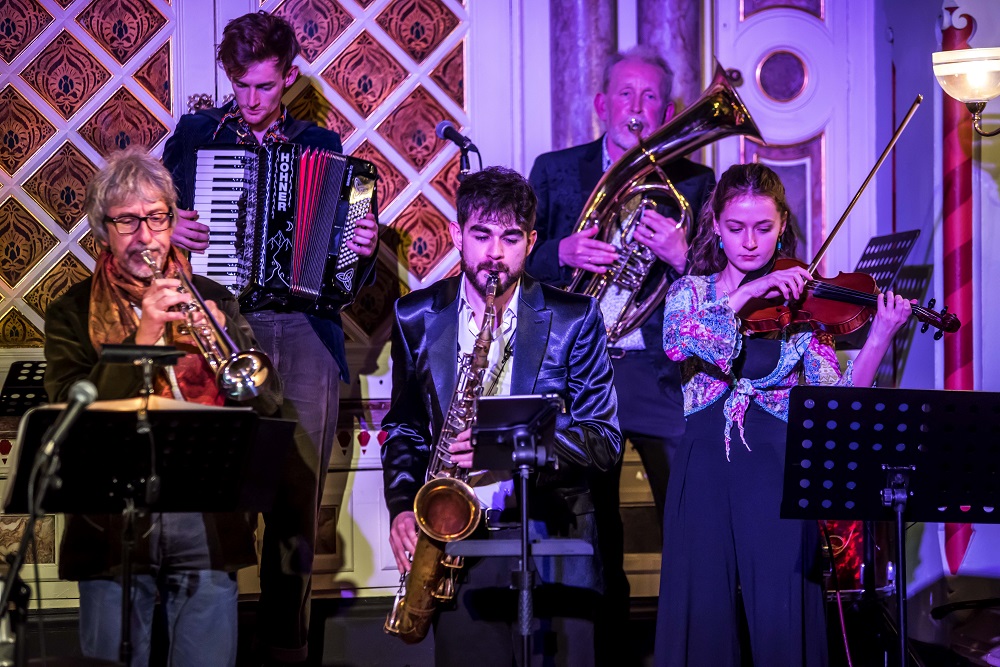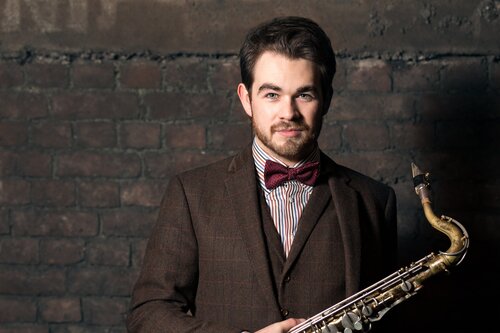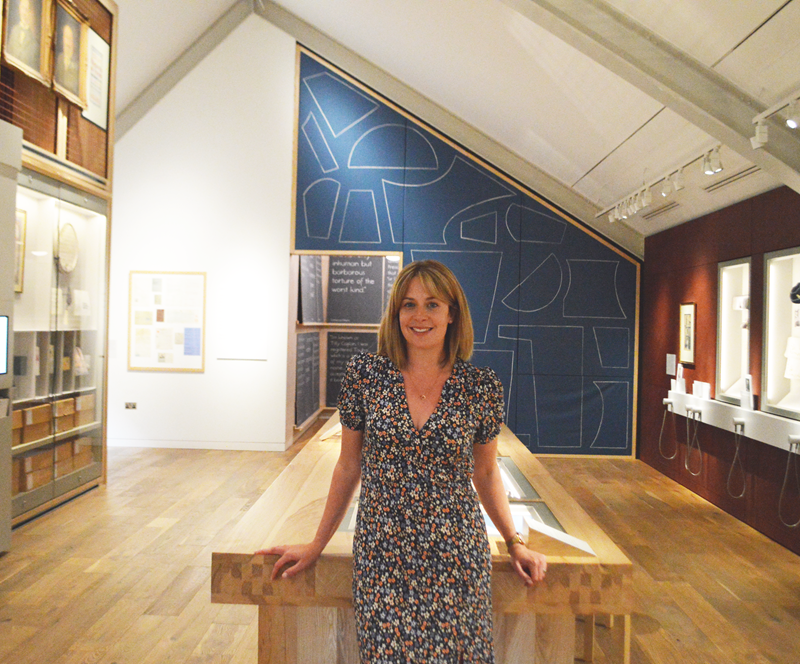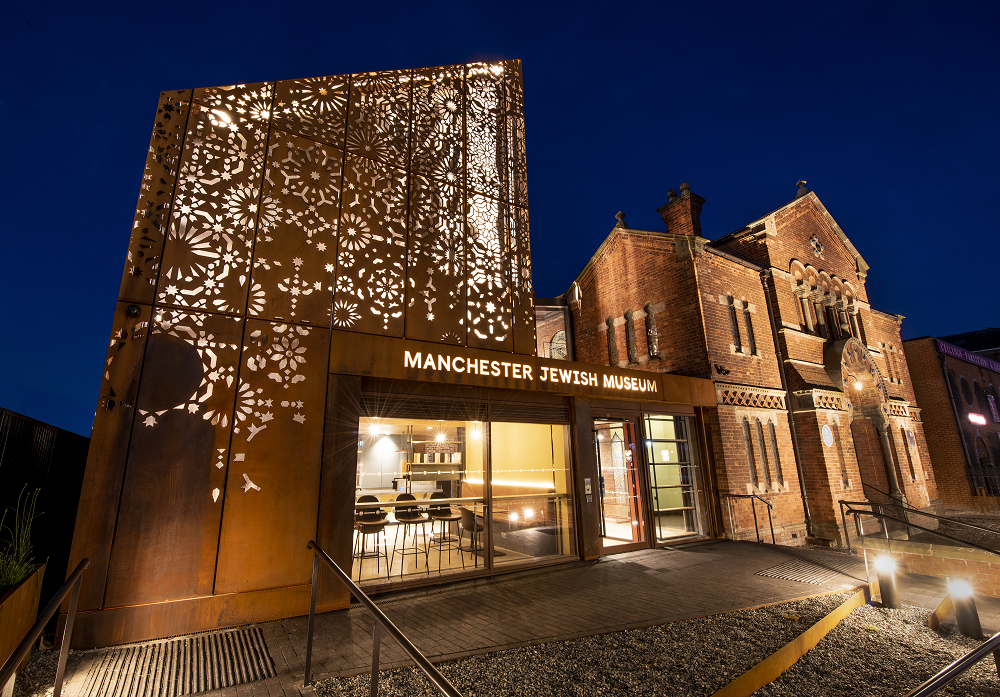Diving into klezmer tunes – interview with Richard Fay and Daniel Mawson
This June we’re organising the first meeting of the Klezmer Tune Club in cooperation with klezmer musicians, Richard Fay and Daniel Mawson, who will take you on a musical journey through klezmer’s fascinating history and work with you on a new musical piece.
On Tuesday, June 7, we welcome Richard Fay and Daniel Mawson in our new Learning Studio for an evening klezmer session, the first musical meeting opening our Klezmer Tune Club.
Klezmer is a music genre, dating back to the Middle Ages. It was a defining part of the Yiddish-speaking cultures of Eastern European Jewish communities. It gained new influences through migrations (especially to the USA), and is now a global music genre. The club will open up some of this rich tradition for musicians here in Manchester who may already know something about klezmer or may be keen to learn something new and less familiar.Daniel Mawson and Richard Fay lead The University of Manchester Klezmer Ensemble and produce klezmer-based shows such as “Amid the Mirk Over the Irk: When Irish meets klezmer”, “Vessels of Song: Journeys into the Worlds of klezmer”, and “Klezmer Klassica”. They both performed at MJM Synagogue in March 2022, during our Synagogue Nights Season. With Klezmer Tune Club they want to bring klezmer music closer to their audiences while working on an arrangement together.
In this interview we asked Richard and Daniel about their passion for music and the creative process behind Klezmer Tune Club:
Hello Richard, hello Daniel! Can you tell us a little bit more about you and the music genres you like to work with and compose?
Richard: My compositional portfolio has been described as “ethno-classical”. It retains something of the traditions of Western Classical/Art Music with which I was trained but as melded with a number of other musical cultures I have been immersed in over the years including klezmer, Balkan, and Irish trad. The two recent CDs of my compositions, Helix (2019) and Hamosity (2021) capture a selection of these ethno-classical compositions written between 1984-2021.
Daniel: Aside from klezmer, I work across jazz, classical, musical theatre and electroacoustic styles. I think there’s value to be found in all music genres. I, unlike Richard, very much work to a deadline and like to have a brief to work with. Needing a structure in place is probably one of the reasons I’m drawn to arranging music so much.
What inspires you to compose music?
Richard: I have been writing music since my teens, much of the early work constrained by the Western Classical/Art Music traditions in which I was learning my craft, but from my 20s onwards, I increasingly found the ethno-classical space to be more comfortable for voicing my ideas.
It is rare for there not to be a soundtrack of some kind playing in my mind as I go about my daily life. The musical ideas that become my compositions tend to find me rather than me setting out to compose something for a particular purpose or deadline. The tunes come to me, often when I’m out and about doing other things. I usually enshrine some aspect of the time and place of inspiration in the naming of the tune. For example, Bay of Biscay (1984) came to me as I crossed this stretch of sea on a bleak January day all those years ago.
Daniel: I’m always driven by storytelling whenever I write, and I also see music quite visually. Most of the music I write I start with an image or a map, and then I plot out a narrative using the sound to plot.
How did your interest in klezmer start? What do you like about this genre?
Richard: I bought my first record of klezmer music in 1984, a collection of archive recordings re-issued by the Smithsonian Institute as part of the so-called klezmer Revival. Why I bought it, I can’t remember. For sure, from my first listening, something about it attracted me even though I have no Jewish heritage and at that time I hadn’t lived in either Eastern Europe (where most of the music has its origins) or the USA (where most of the recordings were made). I was hooked on its emotional power, and its unfamiliar soundscape drew me in, as did its ‘folk’ characteristics. I hadn’t studied ethnomusicology at that time of my life (this study came later) but I was finding the exploration of music-in-culture and music-as-culture to be endlessly absorbing, and klezmer was a case in point. Later, in about 2011, I had the good fortune to meet Salford-based Ros Hawley, one of the UK’s leading klezmer clarinettists, and with her founded the Michael Kahan Kapeleye (The University of Manchester klezmer ensemble) as embedded it the UK’s only assessed course in klezmer ensemble performance.
Daniel: It was the ensemble Richard and Ros set up that got me interested in klezmer; I took the module back in 2012. It’s such an enjoyable, emotional, and energetic music to play and I got the bug for playing it. When Ros left I took over at the University and Richard and I now teach it together.
Where did the idea behind Klezmer Tune Club come from?
Richard: Before the pandemic, we had been organising klezjams (i.e. klezmer sessions) in pubs such as the Old Abbey Taphouse in Manchester. Whilst fun for those who came along, this format proved difficult to sustain during the lockdowns and we were beginning to think about how and when to resume this dimension of the klezmer scene locally.
Daniel: The klezjams also don’t allow us to really go deeply into the tunes we play, which is really why the tune club is different to those folk-like sessions
Richard: We also became aware of the Museum’s participatory groups and wondered about adding a klezmer club to the mix. We were fortunate to obtain sponsorship for a trial this summer from the SEED Social Responsibility Catalyst Fund at The University of Manchester.
What do you hope audiences will take away from this project?
Richard: Above all else, a deepened curiosity about, understanding of, and appreciation for klezmer as a musical culture as accompanied by a growing sense of confidence in playing tunes from this culture with other people.
Daniel: We also hope that participants will have a full klezmer tune to add to their repertoire.
What excites you most about organising this project at Manchester Jewish Museum?
Richard: It is great to be extending our long-standing relationship with the Museum through this klezmer Tune Club. It is a collaboration that goes back to 2013 when where we offered the first of many klezmer performances at the museum. It’s great to be teaching klezmer to a much more diverse group of musicians than we are used to from our klezmer ensemble teaching in the Music Department at The University of Manchester.
Daniel: It also gives the opportunity for us personally to dive into some new tunes and revisiting our regular tunes in new ways
Where do you hope to take this project in the future?
Richard: We very much hope that this trial of the klezmer tune Club will be successful and that we can then add the club to the museum’s set of clubs and run it monthly from the autumn onwards. The club forms an important strand of our klezmer-focused work together. It will, we hope, sit alongside the university klezmer teaching we do and the development of shows such as “Vessels of Song: Journeys into the worlds of klezmer”, “Amid the Mirk Over the Irk: When Irish Meets klezmer”, and “Klezmer Klassica”. We see the museum as a core partner in these collaborations and we are proud to have been working with the museum for the last decade and are very much enjoying working more dynamically with it in this new era for the museum.









